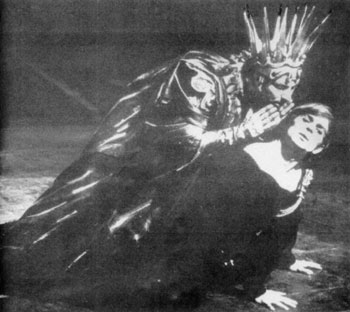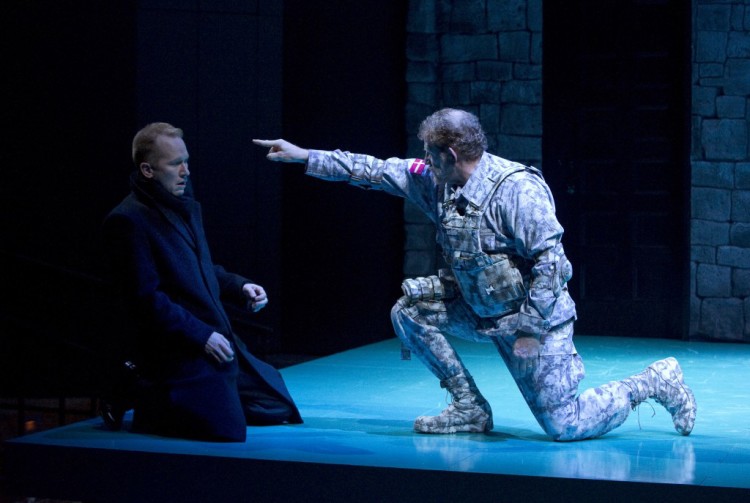We have our ghosts. We have flash points of rage. This play taps into what we seek to keep from others — the ghosts who speak only to us, the private furies that burn and burn.
Maybe that fury rose up after years of slights or after one slap or public shaming or one act of cruelty. Maybe your response had been immediate and this rage broke out in blistering words or in a terrible, irretrievable moment. Maybe your response ulcerates within you even now, taking its toll, and you, like most, do nothing but hope for retribution. Maybe your fury crouches within you, eyes open, quiet, alert, patient, debilitating.
Haunting requires a ghost and believers. The spirits rise from the dead or from the buried past. The believers suffer their resurrection.
What form does your ghost take? What memory will not depart? What phantom visits you in dreams? Whose beseeching or castigating voice do you hear? What pursues you — what regrets track you for what you did not do? What have you done that cannot be undone?
Hamlet is haunted by his father, by Claudius, by his mother’s betrayal, by his own sense of ‘cowardice’, by Ophelia’s deception, and by his own fractured heart. Laertes is haunted by the murder of his father and by his desire for vengeance. Gertrude by her guilt. Ophelia by all her losses and her isolation. Claudius by his crime. Even Horatio, the voice of reason, is darkly attended by Hamlet’s death, by all he has witnessed and by the story he is under obligation to tell. The Ghost cannot escape Purgatory nor the treachery which has spurred his impotent ferocity. But he can do one thing — the Ghost makes everything happen.
Marcellus cries that “something is rotten in the state Denmark” and wonderful, rational Horatio answers, “Heaven will direct it.” No, in this play Heaven directs nothing. The shackled, mourning, implacable Ghost sets the hunt into motion. Men follow his trail and do awful things.
The Ghost is a shifting soul, both nightmarish and mournful, tenuous and heavily weighted with sorrow, armor and anger. He exists both outside the pale of death and in the world — he speaks; he is visible to the eyes of five men and thus intersects with light. He is not a dream. He inhabits space and time, but he also knows the secrets of the “prison-house”, Purgatory, where he now spends his days.
 He materializes five times, this suffering, hating, loving thing, wrenched by his inability to act like the man who slew a king when his nation was at risk. Now he must ask his bookish son for vengeance. How maddening that must feel!
He materializes five times, this suffering, hating, loving thing, wrenched by his inability to act like the man who slew a king when his nation was at risk. Now he must ask his bookish son for vengeance. How maddening that must feel!
Hamlet the King, who once “dared to the combat did slay this Fortinbras,” another King, in a single encounter when Denmark depended upon his nerve and skill. Now a pitiable ghost “that shrinks away with dawn,” he is controlled by someone more powerful** who forbids him to speak “of his prison house”. He has been “confined” and “doomed”. He is tormented. He is “a guilty thing” who skulks about his former palace. Though he can neither touch her nor speak to her, he remains in love with the wife who betrayed him in adultery. He even does what he can to protect her from his son’s anger. He is the tremulous embodiment of our unrequited, ruined loves.
Whatever else is not allowed, the afterlife does give approval to revenge; one may kill those who dishonor you. So, he comes back to haunt his son into action. The Ghost pushes Hamlet hard to go after “that adulterate beast”, his brother, Claudius. He uses compliments, commands, his son’s desire for approval, pity and moral arguments to try to motivate Hamlet. I suspect you and I would have done the same. Shakespeare’s abiding genius is to give us characters whose inner lives so closely record so many of our own most private burdens and atavistic passions.
*first photo from The Oregon Shakespeare’s Hamlet, 2010; Don Donahue as Hamlet, Howie Seago as the Ghost
** presumably God
